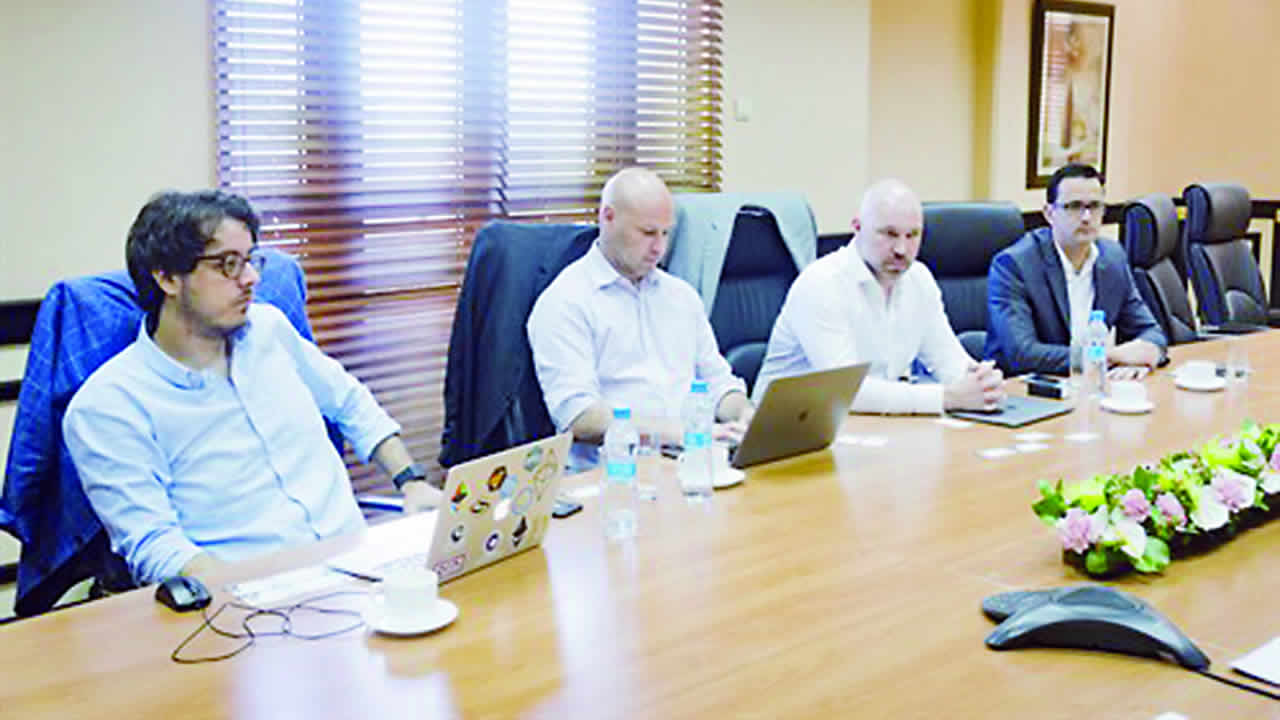
Mauritius will not spared by the Blockchain technology trend that is gripping the world. While local enterprises are, so far, more or less unaware of the advantages of Blockchain, foreign investors are already exploring its potential in Mauritius. However, the absence of appropriate legal framework is one major obstacle to its successful development here.
Consensys, one of the leaders in the development of Blockchain solutions, was in Mauritius last week, on an investment prospection visit. The Consensys delegation was led by Joseph Lubin, co-founder of Ethereum & Consensys, John Lilic, Director for Enterprise Business Technology Development, Strategy and Operations and Jeremy Millar, Chief of Staff at Consensys. The main objective of the visit was to educate key local stakeholders with a view to positioning Mauritius as a blockchain hub. Consensys also explored the possibility to set up operations in Mauritius. Indeed, the government is committed to promote Blockchain technology, as it is one of the key areas that will shape the future and create new opportunities and growth.
Blockchain technology has been a hot topic in Mauritius since last year. It is also in the news across the globe, though for many, the technology is unknown. Yet, the concept is simple though it remains one of the most transformational and misunderstood technologies of our time.
Historically, when it comes to monetary and non-monetary transactions, people and businesses have always relied heavily on intermediaries like banks and governments to ensure trust and certainty. Middlemen perform a range of important tasks that help build trust into the transactional process like authentication and record keeping.
The need for intermediaries is especially acute when making a digital transaction. Because digital assets like money, stocks & intellectual property, are essentially files, they are incredibly easy to reproduce. This creates what is known as the double spending problem (the act of spending the same unit of value more than once) which, until now, has prevented the peer to peer transfer of digital assets. But what if there was a way of conducting digital transactions without a third party intermediary?
Blockchain Vs Bitcoin
Bitcoin first appeared in a 2008 white paper authored by a person, or persons using the pseudonym Satoshi Nakamoto. The white paper detailed an innovative peer to peer electronic cash system called Bitcoin that enabled online payments to be transferred directly, without an intermediary. While the proposed bitcoin payment system was exciting and innovative, it was the mechanics of how it worked that was truly revolutionary. Shortly after the white paper’s release, it became evident that the main technical innovation was not the digital currency itself but the technology that lay behind it, known today as Blockchain.
Although commonly associated with Bitcoin, Blockchain technology has many other applications. Bitcoin is merely the first and most well-known uses. In fact, Bitcoin is only one of about seven hundred applications that use the Blockchain operating system today. One example of the evolution and broad application of Blockchain, beyond digital currency, is the development of the Ethereum public blockchain, which is providing a way to execute peer to peer contracts.
How it works
Blockchain is a type of distributed ledger or decentralised database that keeps records of digital transactions. Rather than having a central administrator like a traditional database, (banks, governments and accountants), a distributed ledger has a network of replicated databases, synchronised via the internet and visible to anyone within the network. Blockchain networks can be private with restricted membership similar to an intranet, or public, like the Internet, accessible to any person in the world.
When a digital transaction is carried out, it is grouped together in a cryptographically protected block with other transactions that have occurred in the last 10 minutes and sent out to the entire network. Miners (members in the network with high levels of computing power) then compete to validate the transactions by solving complex coded problems. The first miner to solve the problems and validate the block receives a reward. (In the Bitcoin Blockchain network, for example, a miner would receive Bitcoins).
The validated block of transactions is then timestamped and added to a chain in a linear, chronological order. New blocks of validated transactions are linked to older blocks, making a chain of blocks that show every transaction made in the history of that blockchain. The entire chain is continually updated so that every ledger in the network is the same, giving each member the ability to prove who owns what at any given time.
Legislative obstacle
In September 2016, the Board of Investment organised a seminar on the Blockchain technology and held many workshops with the collaboration of the Ministry of Information Technology, the Financial Services Commission, the Mauritius Bankers Association and entrepreneurs associations. Gerard Sanspeur, Special Adviser at the Ministry of Finance, stated that, technically ten projects could be launched immediately, however the main obstacle was the absence of a legislative framework. This is why the Budget last year introduced a ‘Regulatory Sandbox Licence’ to cater for those new activities for whch no appropriate legislation exists. Thus, Blockchain falls under this category for the time being. He also stated that, globally, there were about 4,000 developers specialized in Blockchain technology and that young professionals in Mauritius could embark in this field which would be very promising. Readers will note that the adoption of Blockchain technology is in line with the country’s ambition of becoming a regional ‘FinTech Hub’. However odd as it may sounds, the term ‘Blockchain’ is till non-existent on the website of the Financial Services Commission and of the Bank of Mauritius. So much for financial literacy.
Blockchain’s decentralised, open & cryptographic nature allows people to trust each other and transact peer to peer, making the need for intermediaries obsolete. This also brings unprecedented security benefits. Hacking attacks that commonly impact large centralised intermediaries like banks would be virtually impossible to pull off on the blockchain. For example — if someone wanted to hack into a particular block in a blockchain, a hacker would not only need to hack into that specific block, but all of the proceeding blocks going back the entire history of that blockchain. And they would need to do it on every ledger in the network, which could be millions, simultaneously.
The applications
Blockchain has applications that go way beyond obvious things like digital currencies and money transfers. From electronic voting, smart contracts & digitally recorded property assets to patient health records management and proof of ownership for digital content.
Blockchain will profoundly disrupt hundreds of industries that rely on intermediaries, including banking, finance, academia, real estate, insurance, legal, health care and the public sector — amongst many others. This will result in job losses and the complete transformation of entire industries. But overall, the elimination of intermediaries brings mostly positive benefits. Banks and governments, for example, often impede the free flow of business because of the time it takes to process transactions and regulatory requirements. The Blockchain will enable an increased amount of people and businesses to trade much more frequently and efficiently, significantly boosting local and international trade. Blockchain technology would also eliminate expensive intermediary fees that have become a burden on individuals and businesses, especially in the remittances space.
Perhaps most profoundly, Blockchain promises to democratise and expand the global financial system. Giving people who have limited exposure to the global economy, better access to financial and payment systems and stronger protection against corruption and exploitation.
Mauritius can become ‘Blockchain Valley’
The head of Bitland Global, whose startup launched a project to put land registry in Ghana on Blockchain last year, has touted Mauritius to become the “Blockchain Valley” through the advent of a ‘cybersecurity Hague’ for international data houses. Christopher Bates, during his session with young entrepreneurs and business incubators at Blockchain working session last year, maintained that the move will contribute to economic growth for the East African nation. According to him, Mauritius seems to be one of the best spots in Africa to nurture innovation presently.
 J'aime
J'aime














